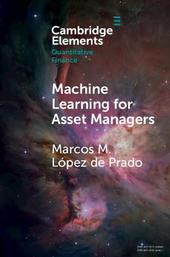
|
Machine Learning for Asset Managers
Paperback / softback
Main Details
| Title |
Machine Learning for Asset Managers
|
| Authors and Contributors |
By (author) Marcos M. Lopez de Prado
|
| Series | Elements in Quantitative Finance |
|---|
| Physical Properties |
| Format:Paperback / softback | | Pages:152 | | Dimensions(mm): Height 230,Width 152 |
|
| Category/Genre | Finance |
|---|
| ISBN/Barcode |
9781108792899
|
| Classifications | Dewey:332.10681 |
|---|
| Audience | | Professional & Vocational | |
|---|
| Illustrations |
Worked examples or Exercises; 4 Tables, black and white; 30 Line drawings, black and white
|
|
Publishing Details |
| Publisher |
Cambridge University Press
|
| Imprint |
Cambridge University Press
|
| Publication Date |
30 April 2020 |
| Publication Country |
United Kingdom
|
Description
Successful investment strategies are specific implementations of general theories. An investment strategy that lacks a theoretical justification is likely to be false. Hence, an asset manager should concentrate her efforts on developing a theory rather than on backtesting potential trading rules. The purpose of this Element is to introduce machine learning (ML) tools that can help asset managers discover economic and financial theories. ML is not a black box, and it does not necessarily overfit. ML tools complement rather than replace the classical statistical methods. Some of ML's strengths include (1) a focus on out-of-sample predictability over variance adjudication; (2) the use of computational methods to avoid relying on (potentially unrealistic) assumptions; (3) the ability to "learn" complex specifications, including nonlinear, hierarchical, and noncontinuous interaction effects in a high-dimensional space; and (4) the ability to disentangle the variable search from the specification search, robust to multicollinearity and other substitution effects.
Reviews'The book's excellent introduction explains why machine learning techniques will benefit asset managers substantially and why traditional or classical linear techniques have limitations and are often inadequate in asset management. It makes a strong case that ML is not a black box but a set of data tools that enhance theory and improve data clarity. Lopez de Prado focuses on seven complex problems or topics where applying new techniques developed by ML specialists will add value.' Mark S. Rzepczynski, Enterprising Investor
|